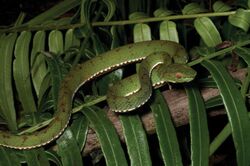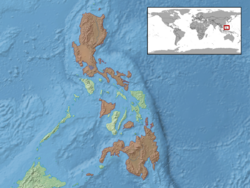Biology:Trimeresurus flavomaculatus
| Trimeresurus flavomaculatus | |
|---|---|

| |
| Scientific classification | |
| Domain: | Eukaryota |
| Kingdom: | Animalia |
| Phylum: | Chordata |
| Class: | Reptilia |
| Order: | Squamata |
| Suborder: | Serpentes |
| Family: | Viperidae |
| Genus: | Trimeresurus |
| Species: | T. flavomaculatus
|
| Binomial name | |
| Trimeresurus flavomaculatus (Gray, 1842)
| |

| |
| Synonyms | |
| |
Trimeresurus flavomaculatus (Philippine pit viper)[4] is a venomous pit viper species endemic to the Philippines . Two subspecies are currently recognized, including the nominate subspecies described here.[5]
Description
According to Leviton (1964), the scalation includes 21 rows of dorsal scales at midbody, 170–178/175–184 ventral scales in males/females, 62–71/58–63 subcaudal scales in males/females, and 9–11 supralabial scales of which the 3rd is the largest. Toriba and Sawai (1990) give 167–179/172–184 ventral scales in males/females, 56–70/53–63 subcaudal scales in males/females, and 9–10/9–12 supralabial scales in males/females.[4]
Geographic range
Found on the Philippines islands of Agutayan, Batan, Camiguin, Catanduanes, Dinagat, Jolo, Leyte, Luzon, Mindanao, Mindoro, Negros, Panay and Polillo. The type locality given is "Philippine Islands". Leviton (1964) proposed that this be restricted to "Luzon Island".[2]
Subspecies
| Subspecies[5] | Taxon author[5] | Common name | Geographic range |
|---|---|---|---|
| T. f. flavomaculatus | (Gray, 1842) | Philippine pit viper[4] | Philippines islands of Agutayan, Bohol, Camiguin, Catanduanes, Dinagat, Jolo, Leyte, Luzon, Mindanao, Mindoro, Negros and Panay.[4] |
| T. f. halieus | Griffin, 1910 | The Philippines on the island of Polillo.[2] |
Taxonomy
Gumprecht (2001, 2002) relegates T. f. halieus to synonymy and elevates T. f. mcgregori to a full species.[4]
References
- ↑ Brown, R.; Sy, E.; Reizl Jose, Juan Carlos Gonzales, Rico, E.; Ledesma, M. (2009). "Trimeresurus flavomaculatus". IUCN Red List of Threatened Species 2009: e.T169885A6686236. doi:10.2305/IUCN.UK.2009-2.RLTS.T169885A6686236.en. https://www.iucnredlist.org/species/169885/6686236. Retrieved 20 November 2021.
- ↑ 2.0 2.1 2.2 McDiarmid RW, Campbell JA, Touré T. 1999. Snake Species of the World: A Taxonomic and Geographic Reference, Volume 1. Herpetologists' League. 511 pp. ISBN:1-893777-00-6 (series). ISBN:1-893777-01-4 (volume).
- ↑ The Reptile Database. www.reptile-database.org.
- ↑ 4.0 4.1 4.2 4.3 4.4 Gumprecht A, Tillack F, Orlov NL, Captain A, Ryabov S. 2004. Asian Pit vipers. GeitjeBooks. Berlin. 1st Edition. 368 pp. ISBN:3-937975-00-4.
- ↑ 5.0 5.1 5.2 "Trimeresurus flavomaculatus". Integrated Taxonomic Information System. https://www.itis.gov/servlet/SingleRpt/SingleRpt?search_topic=TSN&search_value=634912. Retrieved 3 August 2007.
Further reading
- Gray, J.E. 1842. Synopsis of the species of Rattle-Snakes, or Family of CROTALIDAE. Zoological Miscellany 2: 47–51. ("Magæra flavomaculatus", p. 49.)
- Leviton, A.E. 1964. Contributions to a review of Philippine snakes, V. The snakes of the genus Trimeresurus. Philippine Journal of Science 93: 251–276.
External links
- Trimeresurus flavomaculatus at the Reptarium.cz Reptile Database. Accessed 21 November 2012.
- Parias (Trimeresurus) flavomaculatus images at Calphotos. Accessed 6 December 2007.
Wikidata ☰ Q3006721 entry
 |


